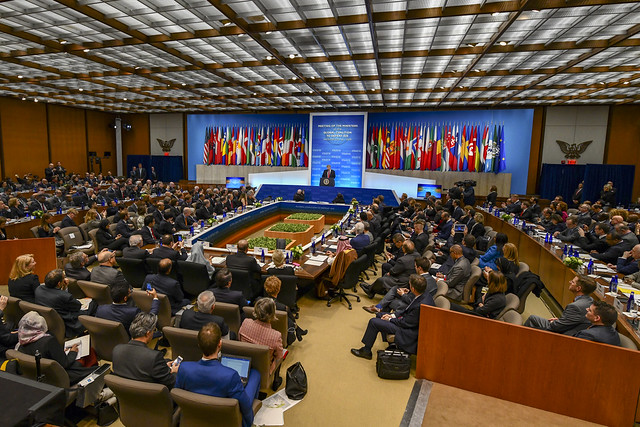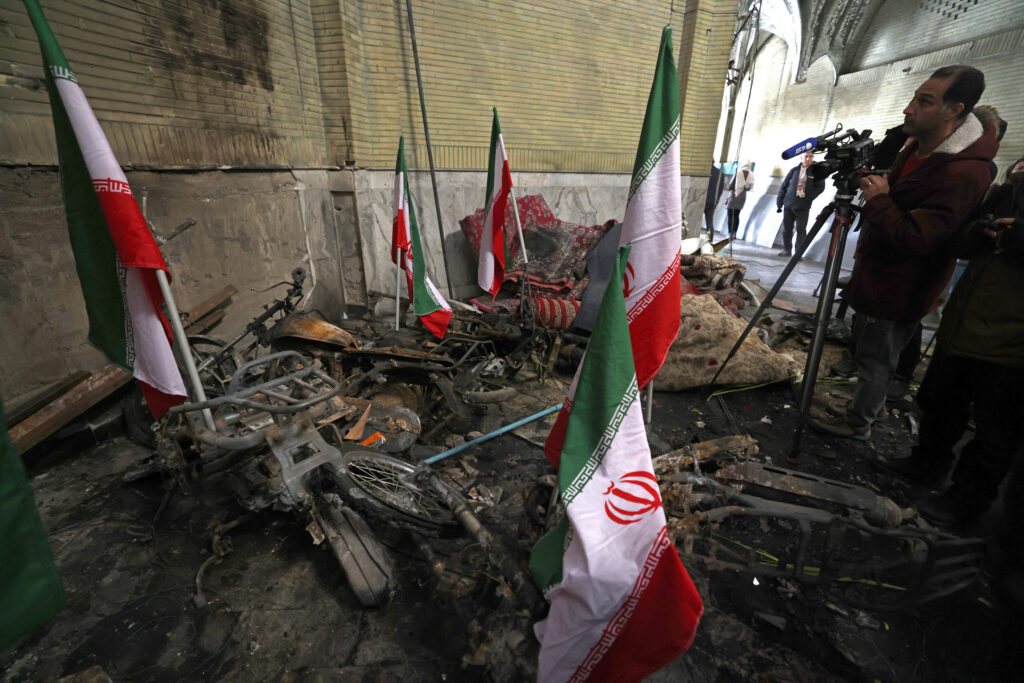In a volatile Middle East with proliferating threats and regional middle powers competing for influence, some states are using multinational, ad-hoc security coalitions to address specific security needs and advance strategic interests. This article presents some important insights into the security implications of such informal alliances for small states in terms of stability and predictability, strategic alignment options and potential for political influence.
CLICK HERE FOR THE PDF
By Rory Miller and Sarah Cardaun*
Informal multinational security coalitions are the most recent iteration of security alliances in the evolving security architecture of the Middle East. The four most significant are the Global Coalition against Daesh (or ISIS, as it is better known), formed in September 2014, the Arab Coalition in Yemen assembled in March 2015, the Islamic Military Counter Terrorism Coalition (IMCTC) established in December 2015 and the anti-Qatar coalition launched in June 2017. In their early stages, these coalitions were lauded by officials in participating nations for their “crucial role…in the defense and collective security of the region”, as top Bahraini official Abdulla Bin Ahmed Al Khalifa put it. In 2016, then Saudi Chief of Staff Major-General Taher Al-Aqeeli described the Yemen Coalition as “a turning point in Arab joint actions” and evidence that “inter-Arab relations have moved to a new and sophisticated state”. Top Emirati official Anwar Gargash even argued that these coalitions might provide a viable “alternative model” to Western intervention across the Middle East.[1]
But these coalitions have not been able to live up to these high expectations, at least not yet. While the international anti-ISIS coalition was ultimately successful in the territorial defeat of the terror group, the other three security alliances are far less effective. The IMCTC has not been particularly active beyond declaratory rhetoric since its inception. The limitations of the Yemen and anti-Qatar coalitions are visible for all to see on a weekly basis. Meanwhile, recent US-led efforts to bring local allies together in a more formal Middle East Strategic Alliance (MESA) are an indicator that policymakers in Washington are sceptical over the viability of such informal coalitions in the Middle East, at least concerning their potential to serve US interests in the region.
Despite their limitations, informal security coalitions have become an increasingly central component of regional security. Saudi Arabia and the UAE in particular have turned to such frameworks in response to rising geopolitical instability, uncertainty and disorder caused by the prevalence of weak states and strong insurgencies, violent transnational non-state actors and a shifting regional balance of power owing to intensified rivalries between aspiring regional hegemons — developments that have occurred at a time when the United States continued rolling back its active involvement in the region. This is the background against which regional middle powers have begun utilising informal alliances in order to advance regional interests, develop security and enforcement capabilities and foster a consensus in the area of security governance.
Key features of informal multinational security coalitions
Although the four coalitions mentioned above are different in size, sophistication and mandate, they share several key characteristics. While contingent local and regional factors should also be taken into account in explaining their emergence, their rise fits in with a larger, global, trend towards “patterns of ad-hoc coalition-building” and “improvised strategies of collective action”, addressed under the term “collective conflict management” in the work of Chester A. Crocker and others.[2]
Between them, the four coalitions can claim a membership of nearly 100 sovereign states. Geographically, these countries transcend one particular region. Participants in the Arab Coalition in Yemen, for instance, have included several North and West African nations. In the case of the IMCTC, 15 out of a total of 41 member states are located more than 4,000 kilometers from Riyadh, the home of the coalition’s headquarters. Moreover, the diverse membership of informal alliances includes various non- and sub-state actors. The Global Coalition against Daesh counts five non-state entities and regional organisations among its participants and the anti-Qatar coalition includes the Tobruk-based House of Representative government in Libya.
In addition to the diversity in coalition members, another key characteristic of informal alliances is their focus on a specific threat, security challenge or mission. In contrast to traditional alliances, which are built on long-term political alignments and international cooperation, the raison d’être of informal ad-hoc coalitions is almost exclusively issue-specific: The mission of the IMCTC is to coordinate and support military operations in the fight against terrorism; in the case of the Yemen Coalition, it is to counter the threat posed by the Houthi rebels and their Iranian backers as well as Al-Qaeda in the Arabian Peninsula (AQAP).
The flexible, improvised nature of such alliances, which avoid precedent-setting footprints, affects the management of operational tasks as well as the levels and nature of cooperation between members. Overcoming one of the major constraints of formal “inside-out” alliances such as the Gulf Cooperation Council (GCC), informal coalitions do not have strict conditions for admission like those that prevented the expansion of the GCC beyond its six founding members. Furthermore, contributors to informal coalitions usually agree to join without any resort to formal arrangements such as treaties or institutions. As Adel Al-Jubeir, Saudi Arabia’s then Minister of Foreign Affairs, explained at the time of the launch of the IMCTC, individual partners could decide “what to contribute, and when to contribute it, and in what form and shape they would like to make that contribution.”[3] In most cases, there is no expectation on the part of participants that their involvement will lead to an enduring institutional relationship. These are, in other words, true “coalitions of the willing”. Not only can they be easily disbanded once the mission is completed, but members can also walk away before that, as was evident in Morocco’s decision to withdraw from the Arab Coalition in Yemen in early 2019.[4]
One can discern three distinct but often overlapping security relationships across these informal coalitions. The first, in the case of the anti-ISIS and Yemen coalitions, is the relationship between major external actors, on the one hand, and regional middle powers and small states, on the other hand. The second is between local middle powers in a leadership role, such as Saudi Arabia and the UAE, and other middle powers who participate as subordinate members, such as Pakistan, Egypt, or Malaysia. The third security relationship evident inside these informal coalitions is that between middle power leaders (Saudi Arabia, Egypt and the UAE) and small states and non-state actors. Thinking about this third relationship provides an opportunity to highlight some questions that informal coalitions raise for the foreign and security policies of different categories of actors, in this case small states.
Informal coalitions and the security needs of small states
A key debate in the small state literature is whether it is now “obsolete” to think of small states in traditional neo-realist terms as vulnerable, weak and largely irrelevant in the face of great power politics.[5] It is true that there is a great diversity of foreign policy behaviour within the small state category and that there are good arguments for paying more attention to the broad range and effectiveness of some foreign policy and security tools leveraged by small states. However, this does not change the fact that small states are affected differently and more severely by many security threats than larger states. This makes the rise of new types of regional and international security frameworks with distinct characteristics — such as informal security coalitions — of utmost relevance and raises the question whether they are suitable frameworks for the security needs of small states.
For various reasons, small states have traditionally been attracted to formal, multilateral institutions. To begin with, these usually offer stability and predictability or even entail security guarantees enshrined in a treaty, all of which can be vital for small state security. Being neither collective security nor collective defence frameworks, informal coalitions do not offer any of that. On the contrary, the absence of written agreements results in a considerable risk of being “abandoned” by the coalition leaders. An example was US President Donald Trump’s announcement in December 2018 of his intention to withdraw American troops from Syria after the final phase of offensive anti-ISIS operations, which left key coalition partners, such as Kurdish factions and the Syrian Democratic Forces (SDF), in a strategically vulnerable position. In informal alliances the concrete mission takes priority over any potential security commitments to coalition partners in so far as they even exist. This is a reality that member states of all sizes face, including non-state actors, as the Syrian example shows. However, because the security of small states usually depends on some form of security assurances from allies, it affects them far more than larger states.
All of this does not mean that small states and other weak contributors do not gain any advantages from short-term military coalitions. The fight against specific security threats — such as terrorist groups — is certainly something that all actors affected by the threat benefit from. Small states are often not capable of countering such threats alone. But this comes at a price: While small states’ military and financial contributions in informal coalitions are normally significantly lower than those of larger nations, ad-hoc alliances make outright “free-riding” — something that has long been debated in the context of formal security alliances — much more difficult. This is because in ad-hoc coalitions, which only exist for a specific mission or task, contributions of each member are more visible and subject to scrutiny. Participants, including small states, cannot hide in the shadows; membership always entails some level of active participation — the very definition of being part of a coalition.
In principle, the very same non-binding nature of cooperation in informal frameworks that makes them unsuitable as security guarantees or vehicles for outright free-riding also reduces the risk of entrapment — a scenario feared especially by weaker partners in long-term alliances, in which they are forced into conflict situations they would otherwise prefer to avoid. If military or other security interventions escalate in ways that a coalition partner does not support, the exit option is always available. We see this clearly in the case of the anti-Qatar coalition. Since joining the Saudi-UAE led group in June 2017, the Maldives, Chad, Comoros, Gabon, Djibouti and Jordan have all walked back some of their initial support for the blockade.
Non-formal, issue-focused coalitions also have implications for alignment strategies in other ways. They can facilitate “hedging”, a strategy frequently employed by small states between balancing and bandwagoning. Having said this, it is also important to note that despite the flexibility inherent in informal coalitions, to some extent they also are an expression of longer-term strategic positioning and at the same time influence future political alignment options. Sudan’s participation in the Arab Coalition in Yemen, for instance, can be interpreted as an indicator of its political shift towards the Arab Gulf countries, which has played out domestically during the recent change of regime, and also further consolidates this alignment. Participation in a coalition or campaign inadvertently draws a country further into the realm of the leading actors and therefore affects longer-term relations with the respective regional rivals. Small states need to be aware of that, especially in the current regional context of dynamic multipolarity, where several middle powers compete for regional hegemony.
A final set of reasons why small states are drawn to traditional alliances, especially in their institutionalised versions, is related to their potential to enhance small states’ political influence. Particularly in one-state-one-vote frameworks, international or regional security institutions can act as fora for small states to develop and exercise forms of “collective power”.[6] Institutions also allow small members some level of individual influence otherwise unavailable — as long as they are willing and able to take advantage of institutional opportunity structures, such as chairing meetings and engaging in agenda setting.[7]
At first sight, it seems that informal coalitions do not offer the same advantages to small states. In terms of potential influence, compared to institutions such as the EU, NATO or the GCC, there are far fewer opportunities in informal security coalitions for small members to play an impactful role in policy formulation. They cannot, for example, take advantage of formal institutional mechanisms; there is little opportunity to act as norm entrepreneurs; and soft-balancing appears to be more difficult in informal coalitions for smaller actors. Moreover, the informality of theses coalitions allows the dominant actor to impose its own agenda and to promote specific objectives in line with narrow national interests.
But it is not impossible for small states to have influence in, or through, informal alliances. The prospect for this to happen improves if there is a convergence of objectives between the small state and the dominant actor and if the small state can exercise leverage over, or at least work in partnership with, the coalition leader. Informal coalitions therefore can — given the right constellations — be a tool for small states to expand regional influence beyond what the military capabilities of a small state would otherwise allow for. An example is the success of the UAE in establishing considerable military, political and administrative control in parts of south Yemen since the start of the military campaigns in the country in 2015. Its partnership with Saudi Arabia and other coalition members in the context of the coalition, including external supporters such as the United States, has provided the small state with a framework to leverage its own security capabilities as well as existing ties to local allies and utilise those to pursue its specific foreign and security aims. Thus, there are even cases in which informal coalitions can be a vehicle for small states to have more influence than their size would normally allow for, given the right circumstances and smart strategies.
About the authors
Rory Miller is a Professor of Government at Georgetown University in Qatar. He is Principal Investigator on a project on multinational security coalitions funded by the Gerda Henkel Foundation in Germany. His most recent books are Desert Kingdoms to Global Powers; The Rise of the Arab Gulf (Yale University Press, 2016) and The Gulf Crisis: The View from Qatar (HBKU Press, 2018).
Sarah Cardaun is a full-time researcher in the project on multinational security coalitions funded by the Gerda Henkel Foundation in Germany. She received her PhD from King’s College, London, and she is the author of Countering Contemporary Antisemitism in Britain (Brill, 2015).
* The authors would like to acknowledge the support of the Gerda Henkel Stiftung for its funding of the research project on informal security coalitions in the Arab and Muslim world that resulted in this publication.
Caption for image:
US President Donald Trump delivers remarks at the Meeting of the Ministers of the Global Coalition to Defeat ISIS on 6 February 2019. Photo: US State Department
[1] H.E. Dr Shaikh Abdulla bin Ahmed Al Khalifa, “Welcome from the Chairman,” MEMAC Conference Brochure, 2017, http://www.bahraindefence.com/_media/Brochures/MEMAC-Brochure_03-09-2017_WEB.pdf; “Chief of Staff: Arab Coalition a Turning-point in Arab joint actions,” Yemen National Military Web (YNMW), 6 September 2017, https://en.26sepnews.net/2017/09/06/chief-of-staff-arab-coalition-a-turning-point-in-arab-joint-actions/; “UAE says ready to commit troops to fight Syria Jihadists,” Agence France-Presse, 30 November 2015, https://news.yahoo.com/uae-says-ready-commit-troops-fight-syria-jihadists-145913099.html
[2] Chester A. Crocker, Fen Osler Hampson, and Pamela Aall, “Collective Conflict Management: A New Formula for Global Peace and Security Cooperation?” International Affairs 87, no. 1 (2011): 39–58, 40.
[3] Ed Payne and Salma Abdelaziz, “Muslim nations form coalition to fight terror, call Islamic extremism ‘disease’,” CNN, 22 December 2015, https://edition.cnn.com/2015/12/14/middleeast/islamic-coalition-isis-saudi-arabia/index.html
[4] “Morocco suspends participation in Saudi-led war in Yemen,” Al Jazeera, 8 February 2019, https://www.aljazeera.com/news/2019/02/morocco-suspends-participation-saudi-led-war-yemen-190208063234770.html
[5] Alan Chong and Matthias Maass, “Introduction: The Foreign Policy Power of Small States,” Cambridge Review of International Affairs 23, no. 3 (2010): 381–382.
[6] Tom Long, “Small States, Great Power? Gaining Influence Through Intrinsic, Derivative, and Collective Power,” International Studies Review 19, no. 2 (2017): 185–205.
[7] Diana Panke, “Small States in Multilateral Negotiations. What have we Learned?” Cambridge Review of International Affairs 25, no. 3 (2012): 387–398.





